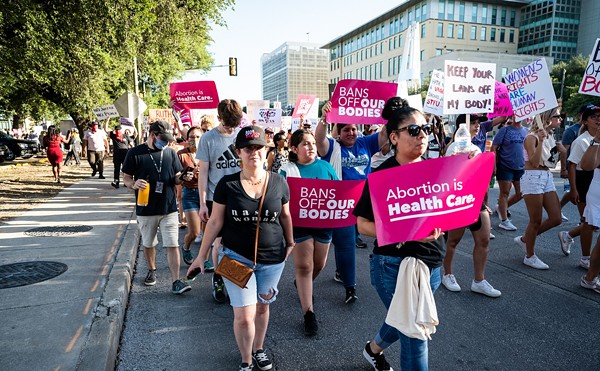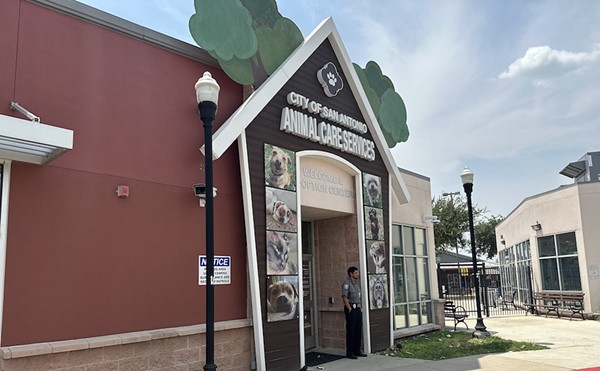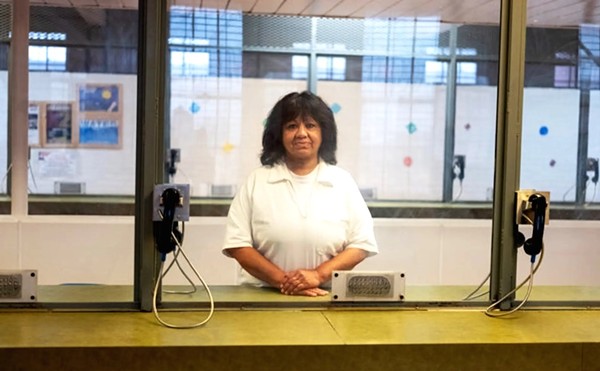District Attorney Susan Reed has been on a steady crusade for over two years to push Bexar County into full-time no-refusal territory, setting up a legal framework to draw blood from any suspected drunk drivers who refuse a breath test any day of the week. And by late October, just before Halloween weekend, she got her wish when, according to her office, San Antonio became the state’s largest metro area to implement a round-the-clock no-refusal policy. It was made possible by a $1.4 million one-year Texas Department of Transportation grant paying for overtime sheriff’s deputies, city cops on DWI patrol, and nurses ready to draw blood from DWI suspects should a judge approve it.
Like many DWI lawyers across the country, local attorney Phil Stauffer cries foul over the policy, calling no-refusal “barbaric” and an affront to civil rights. “I think Susan Reed has way overstepped her bounds. She’s now attempting to do the job of the Legislature and not the district attorney,” he charges.
The county first rolled out so-called no-refusal weekends in May 2008, at first only during major holiday weekends known to see an influx in sauced drivers, then pushing for no-refusal every weekend (like clockwork, from 5 p.m. Fridays to 6 a.m. Mondays) by the start of 2011. And since the start of Reed’s no-refusal experiment, Bexar County has seen intoxication manslaughter cases cut in half, along with a sizable decrease in DWI arrests, according to Assistant District Attorney Chip Rich with the DA’s DWI Task Force. “I handle all the intoxication manslaughter cases in the county, and we just see the death, we see the serious bodily injury cases continually coming in,” he said. “If we’re reducing those types of results, having less and less of those victims, than it’s worth it.”
No-refusal went full-time, seven days a week on October 24. Today, if drivers refuse to blow into a breathalyzer in Bexar County, cops cart the suspect off to the Bexar County magistrate’s office where they are forced to give up blood if an on-call judge approves a search warrant. Rich says the DA’s office keeps someone staffed at the magistrate’s office around the clock to process and push for blood warrants. That blood’s then tested by the county medical examiner’s office and entered into evidence against a driver if charges are filed.
The impetus is two fold: DWI cases can languish in county courts for years, Rich insists, clogging the system while defense attorneys take advantage of the failing memories of arresting officers called to testify on arrests. And no refusal, he says, scores more convictions and quickly, all the while scaring drunks out from behind the driver’s seat.
Stauffer says he still advises drivers to “refuse everything, even in light of this no-refusal garbage, because something can always go wrong with a warrant.” And defense attorney Jamie Balagia, who dubs himself the “DWI Dude,” took out a full-page Express-News ad this spring along with another local DWI lawyer slamming no-refusal policies. Egregious DWI cases, he notes, already call for a mandatory blood test, like if a suspect’s found driving with a child in the car or in cases of intoxication manslaughter. “One of my biggest complaints is the fact that these magistrates, what kind of review are they getting? How many warrants have they refused to sign? We’re never given that information,” Balagia said.
County and police officials have yet to release records for how many blood warrants have been granted versus those requested by police since full-time no-refusal went into effect — the only true way to determine if judges are “rubber stamping” no-refusal blood warrants, as Balagia and Stauffer charge. When the DA’s office announced the new 24/7 no-refusal policy this fall, it said blood samples were secured in nearly 2,000 DWI cases so far this year, over half of which were taken under no-refusal blood warrants. And the no-refusal warrants the DA’s office pushes for typically fly, Rich says. “I’d say that for the most part it will be the majority [of warrants],” he said. “We have a very good success rate in securing those warrants.”
Nationally, about one in four of drivers pulled over for suspected DWI cases refuse to take a breath test, says the National Highway Traffic Safety Administration. By 2010, the NHTSA started posting no-refusal “tool-kits” on its website, even providing sample blood-draw warrants in hopes of exporting no-refusal policies around the country. And the Administration points to the “Texas Example,” noting that statewide refusal was at about 50 percent before several Texas jurisdictions started conducting no refusal weekends in 2005. For instance, in 2010 in Montgomery County, they say, test refusal rates dropped from a peak of 50 percent to 10 percent in 2010.
Statewide, the Texas District and County Attorneys Association insists that the increase in blood search warrants has led to fewer jury trials in DWI cases, more guilty pleas, and plenty more convictions. In a legislative update to members in 2009, TDCAA executive director Rob Kepple wrote, “If it bleeds, it pleads.”
It may be to early to predict how these no-refusal blood-draw cases fare once, and maybe even if, they start heading to trial en masse. Balagia has yet to go to trial on a no-refusal case, but currently has about two dozen cases on deck, with more coming in daily, he said. Since the rollout of the new policy, Stauffer says his office sees some 15 to 20 no-refusal cases walk through his door monthly. “It’s all we see now, and I’m certain we’re gonna start seeing a lot more of them,” he said, predicting it will be at least a year before any of those cases start to hit trial.
But in March, the DA’s office lauded its first no-refusal blood-warrant trial, perhaps offering an indicator for how these cases could play out down the road. A jury returned a guilty verdict in less than 30 minutes, Reed’s office said, when test results from a search-warrant blood draw showed the defendant had a .22 blood alcohol content, nearly three times the legal limit of .08. D



















